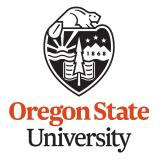Dry Farming as a Drought Response: Soil Health Explorations in Dry Farm Contexts, Oregon

This project plans to expand current work exploring dry farming techniques as a climate adaptation strategy to deal with more drought conditions in western Oregon and Washington when less water is available for irrigation or water users get cut off from water rights. The researchers will use organic production methods to further investigate the role of soil health management for improving soil moisture holding capacity through the application of different treatments. The ultimate goal is to better understand how dry farming in western Oregon and Washington can be used as a drought resilient strategy.
This project will investigate the use of five treatments:
- ‘Dust mulch’ tillage to 4-6 inch depth to stop capillary movement of water from soil and prevent soil evaporation (most common commercial practice - not actually dust, but small soil clumps)
- Deep mulch (leaf or straw)
- Organic high residue cover crop no-till system using rolled cover crop (common vetch or crimson clover)
- Regular tillage treatment (2-3 inch depth)
- Weedy treatment (control).
For more information, please contact Britt Parker (britt.parker@noaa.gov).
Research Snapshot
What to expect from this research
Results from this study will provide information to guide soil health management under dry farming conditions west of the Cascades. Results from this work could enable greater success with producers mitigating drought conditions on their land and reducing overall demand for irrigation supplies, which could lessen impacts of drought. Outputs from this project will be shared via University Extension networks nationally, to enable broader exploration of dry farming tools and their applicability beyond the Northwest.

